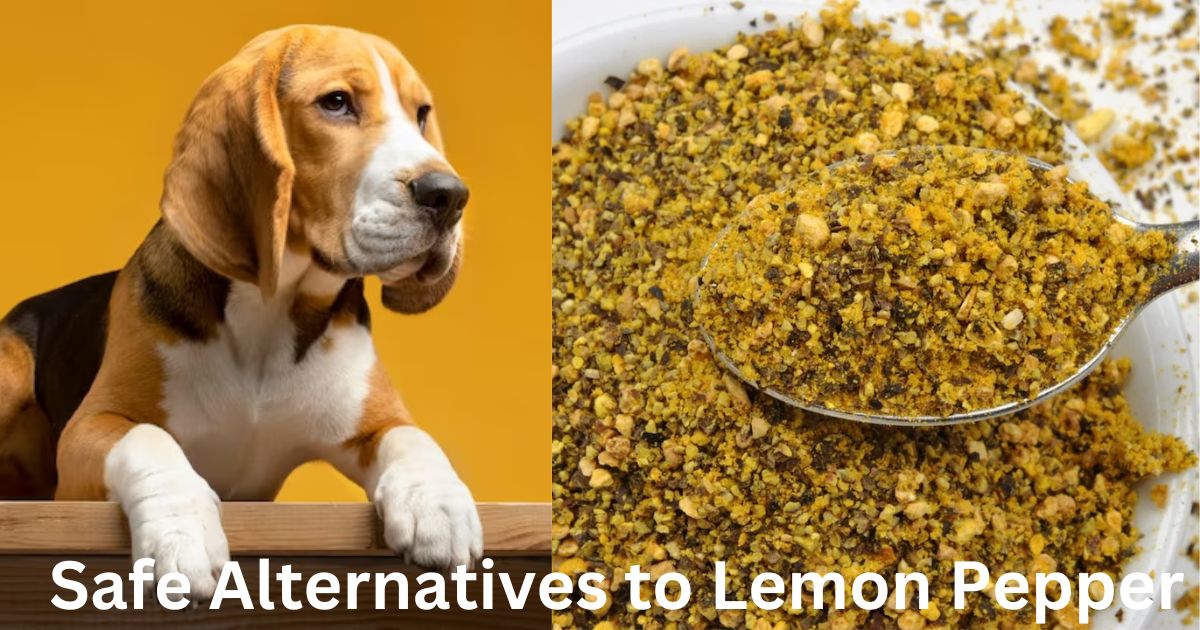Lemon pepper is a popular seasoning that adds zesty lemon and spice flavors to foods like chicken, fish, and vegetables. It’s made from dried lemon peel, black pepper, salt, and sometimes sugar. But is this zesty seasoning safe for dogs to eat? Here’s what pet parents need to know about feeding lemon pepper to dogs.Learn more information “Can Dogs Have Lemon Pepper” In this article.
Is Lemon Pepper Safe For Dogs?

1. Gastrointestinal Issues
Lemon pepper contains dried lemon peel and black pepper, both of which can irritation a dog’s gastrointestinal tract if ingested in large amounts. The citric acid in lemons can cause nausea, vomiting, and diarrhea. And black pepper is known to be irritating to the stomach lining. Consuming too much lemon pepper could lead to an upset stomach.
2. Allergic Reactions
Some dogs may have food allergies or sensitivities to the ingredients in lemon pepper, including lemon peel, black pepper, or salt. An allergic reaction could cause skin irritation, itchiness, vomiting, and diarrhea. If your dog has known food allergies, it’s best to avoid giving them lemon pepper.
3. Salt Content
Lemon pepper seasoning often contains added salt, which can cause problems if dogs consume too much sodium. For dogs with heart or kidney issues, excess salt intake can lead to fluid retention, abnormal heart rhythms, and even seizures. Too much salt isn’t good for healthy dogs either.
4. Choking Hazard
The granular texture of lemon pepper seasoning poses a potential choking risk for dogs. The granules could get lodged in your dog’s throat, especially in breeds with pushed-in noses like Pugs and Bulldogs. This makes lemon pepper a seasoning best avoided for dogs.
5. Nutritional Value
On its own, lemon pepper seasoning provides little to no nutritional value for dogs. It doesn’t offer protein, vitamins, minerals, or other nutrients dogs need in their diet. So seasoning your dog’s food with lemon pepper isn’t recommended.
Safe Alternatives to Lemon Pepper

There are some flavorful, healthier alternatives dog owners can use to add zing to their pet’s meals without health concerns:
- Fresh or dried parsley – adds bright color and mild herbal flavor
- Pumpkin seeds – crunchy fiber and minerals
- Unsalted chicken or veggie broth – boosts moisture and adds savory taste
- Grated carrot – naturally sweet with beta-carotene
- Freeze-dried fruit bits – cranberry, blueberry or apple segments
These ingredients are gentle on delicate stomachs while still enhancing mealtime enjoyment for dogs.
What To Do When Dogs Consume Lemon Pepper Accidentally
If your dog accidentally ingests lemon pepper, here are some steps to take:
- Remain calm and monitor your dog closely for signs of an allergic reaction or gastrointestinal upset. Warning signs include vomiting, diarrhea, coughing, or difficulty breathing.
- Check the ingredient label and determine approximately how much lemon pepper your dog consumed. The more they ingest, the higher the risk for adverse effects.
- Call your veterinarian or the Pet Poison Helpline for guidance, especially if your dog shows concerning symptoms. You may need to bring your dog in for an exam.
- Avoid inducing vomiting at home unless specifically instructed to do so by your vet, as this could do more harm than good.
- Give your dog plenty of fresh water to help dilute the lemon pepper and support hydration. Withhold food temporarily if vomiting occurs.
- Contact emergency veterinary care if your dog exhibits severe symptoms like seizures, collapse, or uncontrollable vomiting/diarrhea after consuming lemon pepper. Swift treatment is needed when reactions are extreme.
Can Dogs Eat Lemon Pepper?
In light of its potential health risks, lemon pepper is generally not recommended for dogs. The spice blend contains too many ingredients that are harsh on dogs’ systems.
Benefits
There are no benefits to intentionally feeding lemon pepper directly to dogs. The seasoning doesn’t provide any nutritional value. Small amounts used to flavor their food are unlikely to be beneficial either.
Risks
The risks of giving dogs lemon pepper outweigh any potential benefits. Lemon, pepper, salt, and other ingredients in the seasoning can cause gastrointestinal issues, allergic reactions, sodium toxicity, choking hazards, and other problems at high enough doses. It’s best to avoid feeding lemon pepper to dogs altogether.
Can Dogs Have Lemon Pepper Seasoning?
Lemon pepper seasoning often contains garlic powder, onion powder, paprika, and other ingredients. This makes most commercial lemon pepper seasonings unsafe for dogs. Even small amounts could cause toxicity. It’s best not to add any lemon pepper to your dog’s food.
Can Dogs Have Paprika?
Paprika, a spice made from ground dried peppers, is sometimes an ingredient in lemon pepper seasoning blends. In small amounts, paprika is generally safe for dogs to consume. It contains antioxidants, vitamins, and minerals. But too much paprika could irritate dogs’ gastrointestinal tracts and be hard for them to digest. Using paprika to season your dog’s food is not recommended due to the risks and lack of significant benefits.
It’s best to keep lemon pepper seasoning of any kind away from your dog for their safety and wellbeing. Monitor your pantry closely and keep food items secure to prevent accidental ingestion. Contact your vet immediately if lemon pepper consumption does occur. With vigilance and care, lemon pepper can be avoided in canine diets where it does not belong.
Related Post : How Fast Can Cattle Dogs Run?
Conclusion
Finally, while lemon pepper spice contains several ingredients that are generally considered safe for dogs, it is important to be cautious due to potential risks. Lemon oil and acidic citrus ingredients can irritate a dog’s digestive system if consumed in large quantities. It’s best to avoid sharing citronella-flavored foods with your dog or using it as a spice in their regular meals. As with any new diet, moderation is key and only starting with a very small amount is advised. Overall, a small lick of cayenne pepper is unlikely to cause harm, but it is not a spice recommended as part of a dog’s daily diet.









